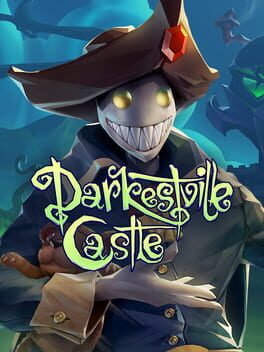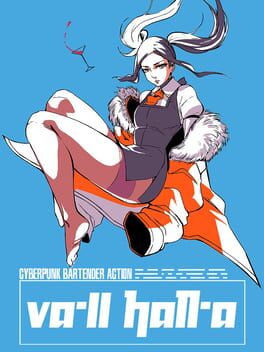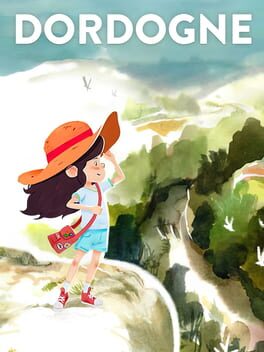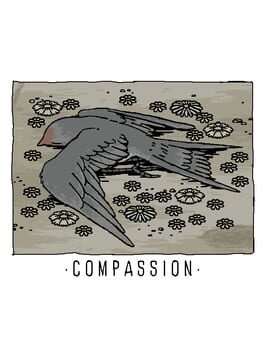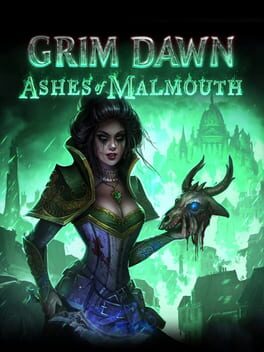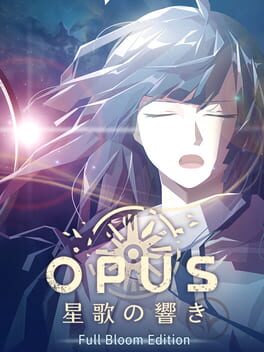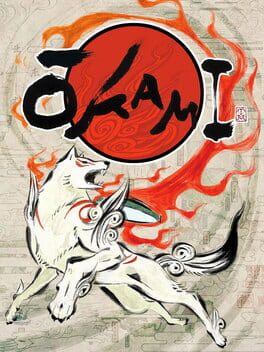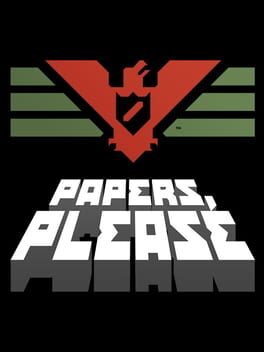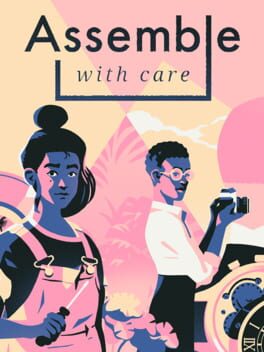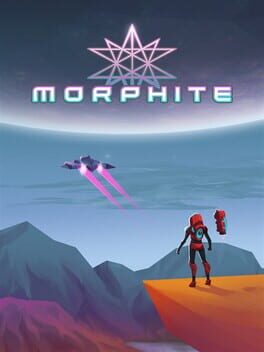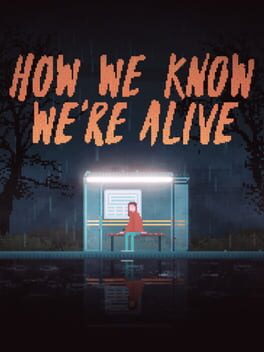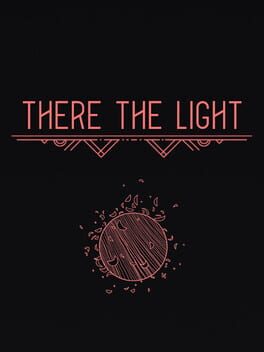mordwywr
228 Reviews liked by mordwywr
Darkestville Castle
2017
You control Cid, a demon who loves causing chaos. Unfortunately for him, a band of demon hunters has come to Darkestville to trap him. Luckily, they don't realize who he is and take someone else. Unfortunately again, it's Cid's precious pet fish Domingo! Now, it's personal, and you must get your pet back! But that's the beginning of this wild night.
Visuals
I absolutely love the artstyle of Darkestville Castle. It's spooky and whimsical and fun! It's dark, but not dreary. And it's colorful, but think Halloween colors, lots of black, purple, greens. All of the characters have their own unique style, but still look like a natural part of this world.
Sound Effects + Music
Darkestville Castle is fully voice acted. There's a narrator to set the scene, and he sounds so good! It's like a movie. All of the characters are also voice acted, no line goes unspoken! Everyone does a great job and it really helps to immerse you in this world. While the text itself is funny, the voices really bring out the humor.
And the music is also great. It's perfectly fun and creepy. Think Addam's Family or Nightmare Before Christmas.
Gameplay + Controls
Darkestville Castle is a standard point-and-click adventure. You move Cid around and click on things. He can look at, talk to, or grab items. Obviously, you need to grab/pick up useful objects that you need for puzzle solving. Sometimes you'll need to look at an item or interact with it in some way multiple times before he becomes useful. If you're familiar with the genre, you know the puzzles can be quite quirky. For the most part, the game does a good job of dropping hints in the dialogue to guide you in the right direction.
I've only played a handful of point-and-click games, so I'm still getting use to the obscurity of some of the solutions. But many of them make perfect sense after the fact, while others I never would have gotten without brute force or a guide. Like that stupid pelican.
Replayability
For me, point-and-clicks are one-and-done type games, so I wouldn't play Darkestville Castle again. I did miss some achievements, but it is possible to get them all in one go if you're careful. The story is super fun and entertaining, so it wouldn't be a chore to go through it again.
Overall
I really enjoyed Darkestville Castle. It has the type of humor that I actually get, and I just loved the Halloween vibes. It was frustrating at times, but that's what guides are for.
Visuals
I absolutely love the artstyle of Darkestville Castle. It's spooky and whimsical and fun! It's dark, but not dreary. And it's colorful, but think Halloween colors, lots of black, purple, greens. All of the characters have their own unique style, but still look like a natural part of this world.
Sound Effects + Music
Darkestville Castle is fully voice acted. There's a narrator to set the scene, and he sounds so good! It's like a movie. All of the characters are also voice acted, no line goes unspoken! Everyone does a great job and it really helps to immerse you in this world. While the text itself is funny, the voices really bring out the humor.
And the music is also great. It's perfectly fun and creepy. Think Addam's Family or Nightmare Before Christmas.
Gameplay + Controls
Darkestville Castle is a standard point-and-click adventure. You move Cid around and click on things. He can look at, talk to, or grab items. Obviously, you need to grab/pick up useful objects that you need for puzzle solving. Sometimes you'll need to look at an item or interact with it in some way multiple times before he becomes useful. If you're familiar with the genre, you know the puzzles can be quite quirky. For the most part, the game does a good job of dropping hints in the dialogue to guide you in the right direction.
I've only played a handful of point-and-click games, so I'm still getting use to the obscurity of some of the solutions. But many of them make perfect sense after the fact, while others I never would have gotten without brute force or a guide. Like that stupid pelican.
Replayability
For me, point-and-clicks are one-and-done type games, so I wouldn't play Darkestville Castle again. I did miss some achievements, but it is possible to get them all in one go if you're careful. The story is super fun and entertaining, so it wouldn't be a chore to go through it again.
Overall
I really enjoyed Darkestville Castle. It has the type of humor that I actually get, and I just loved the Halloween vibes. It was frustrating at times, but that's what guides are for.
In my quest to obtain as many physical copies for games as I could, I bought a Limited Run copy of VA-11 Hall-A on Amazon for about 95 dollars—a 600% markup—and somehow, not once did I doubt that purchase. I automatically assumed that I would love it. I must be psychic, because this game was worth EVERY. DAMN. CENT OF THAT. This is just peak fiction. It doesn’t get any better than this, and I’ll tell you why. Time to mix drinks and change lives.
Pros:
- The storyline of VA-11 Hall-A is so different from being a generic depressing cyberpunk story because the stories of all-powerful corporations, runaway technological development, and the proliferation of the sex industry are told not via those topics themselves, but through the people whom they affect. You get to hear narratives straight from the mouths of those who create them. Trust me, nothing sells “this place is morally bankrupt” more than serving a drink to an android sex worker who holds off on making her child-like body match her mental age because she gets to appeal to a certain…subset of clients. I lived in FEAR of this game ending because of how good the writing is.
- Furthermore, what makes this presentation so good is that it’s not all doom and gloom. While you might not think it based on what I wrote above, VA-11 Hall-A’s writing is actually very light-hearted and humorous (save for a few dire events). These patrons are just trying to live their lives the best they can, and many of them are actually succeeding. The dialogue is just top notch; it's hilarious and thought-provoking at the same time. Nothing I could write here would do it justice. Just go watch a Day 1 playthrough, it’s amazing.
- The characters you meet come from a variety of different backgrounds and no two are the same. Of course, some get more screen time than others as they become regulars in the bar, but I can honestly say no character is boring. They all slap. Dorothy, Gil, Dana, Alma, Sei, Stella, Mario, Betty, Deal, yeah they all go hard, full stop. I could listen to them speak for literal hours.
- And the player character, Jill…she is one of the best written game protagonists I have ever seen. She has a great personality, great lines, great design, she has goals, aspirations, regrets, emotions, and the arc she goes through during this game is spectacular and is capped off in such a satisfying way. This game had me going through the MOTIONS as I played it, all thanks to Jill. And while this is purely subjective, parts of her backstory hit home because they are things that I’VE felt and went through, and that just made me love her even more.
- While VA-11 Hall-A is a visual novel, and thus relies mostly on writing rather than gameplay, I really appreciated its bartending gameplay. What makes it so cool is that what Jill’s patrons say can change at certain points depending on what drinks you make, and in turn that can affect what note the game ends on. Such a dope premise. After each shift, you can also buy items that prevent Jill from becoming distracted at work (and that decorate her apartment), and indeed, if you can’t, the player will actually have to remember what patrons said they wanted, because Jill becomes too distracted to repeat the order to herself. I felt like a genius when I realized that one.
- After each day, you can also mess with apps on Jill’s phone in her apartment, two of which are notable. The first is The Augmented Eye, a news app, which includes both background lore for the setting of Glitch City, and more prominent events that will then be referenced in actual dialogue during shifts! It’s not THAT crazy of a mechanic but I was pleasantly surprised to see it. Danger/u/ is the second, and it's a slightly safer for work version of 4chan. I don’t even think I need to say any more, it’s hilarious.
- The artstyle is super cool as well; it’s reminiscent of older computer graphics. I think the developers even specify that it’s based on the PC-98, which fits the cyberpunk theme perfectly. And the music? I know I constantly praise game soundtracks but this one might be my all-time favorite. Synthpop and electronic music? I eat that up. The musician for this game really crafted some yummy tracks. Bonus points for VA-11 Hall-A actually letting you pick a playlist of twelve songs each time you play.
- One more small praise: when you first boot up the game, it recommends that you get a drink as you play it. And yes, I had some jack and coke for two of my sessions. That’s what I call IMMERSION.
Cons:
- I really don’t have anything major to say as a negative. If I had to say SOMETHING...maybe the developers could have made it a bit easier to tell when the drink you serve can affect the outcome? There were only a few circumstances where I for sure knew what I picked was going to change something, and that was because of story reasons. Regardless, this REALLY did not impact my experience in the slightest, and I know that there were parts I could have changed something but didn't; I just didn't know what to do specifically.
- Finally, an entirely subjective con is that I wish there was more Gil :(
Objective rating: 5 stars
Subjective rating: 5 stars
Pros:
- The storyline of VA-11 Hall-A is so different from being a generic depressing cyberpunk story because the stories of all-powerful corporations, runaway technological development, and the proliferation of the sex industry are told not via those topics themselves, but through the people whom they affect. You get to hear narratives straight from the mouths of those who create them. Trust me, nothing sells “this place is morally bankrupt” more than serving a drink to an android sex worker who holds off on making her child-like body match her mental age because she gets to appeal to a certain…subset of clients. I lived in FEAR of this game ending because of how good the writing is.
- Furthermore, what makes this presentation so good is that it’s not all doom and gloom. While you might not think it based on what I wrote above, VA-11 Hall-A’s writing is actually very light-hearted and humorous (save for a few dire events). These patrons are just trying to live their lives the best they can, and many of them are actually succeeding. The dialogue is just top notch; it's hilarious and thought-provoking at the same time. Nothing I could write here would do it justice. Just go watch a Day 1 playthrough, it’s amazing.
- The characters you meet come from a variety of different backgrounds and no two are the same. Of course, some get more screen time than others as they become regulars in the bar, but I can honestly say no character is boring. They all slap. Dorothy, Gil, Dana, Alma, Sei, Stella, Mario, Betty, Deal, yeah they all go hard, full stop. I could listen to them speak for literal hours.
- And the player character, Jill…she is one of the best written game protagonists I have ever seen. She has a great personality, great lines, great design, she has goals, aspirations, regrets, emotions, and the arc she goes through during this game is spectacular and is capped off in such a satisfying way. This game had me going through the MOTIONS as I played it, all thanks to Jill. And while this is purely subjective, parts of her backstory hit home because they are things that I’VE felt and went through, and that just made me love her even more.
- While VA-11 Hall-A is a visual novel, and thus relies mostly on writing rather than gameplay, I really appreciated its bartending gameplay. What makes it so cool is that what Jill’s patrons say can change at certain points depending on what drinks you make, and in turn that can affect what note the game ends on. Such a dope premise. After each shift, you can also buy items that prevent Jill from becoming distracted at work (and that decorate her apartment), and indeed, if you can’t, the player will actually have to remember what patrons said they wanted, because Jill becomes too distracted to repeat the order to herself. I felt like a genius when I realized that one.
- After each day, you can also mess with apps on Jill’s phone in her apartment, two of which are notable. The first is The Augmented Eye, a news app, which includes both background lore for the setting of Glitch City, and more prominent events that will then be referenced in actual dialogue during shifts! It’s not THAT crazy of a mechanic but I was pleasantly surprised to see it. Danger/u/ is the second, and it's a slightly safer for work version of 4chan. I don’t even think I need to say any more, it’s hilarious.
- The artstyle is super cool as well; it’s reminiscent of older computer graphics. I think the developers even specify that it’s based on the PC-98, which fits the cyberpunk theme perfectly. And the music? I know I constantly praise game soundtracks but this one might be my all-time favorite. Synthpop and electronic music? I eat that up. The musician for this game really crafted some yummy tracks. Bonus points for VA-11 Hall-A actually letting you pick a playlist of twelve songs each time you play.
- One more small praise: when you first boot up the game, it recommends that you get a drink as you play it. And yes, I had some jack and coke for two of my sessions. That’s what I call IMMERSION.
Cons:
- I really don’t have anything major to say as a negative. If I had to say SOMETHING...maybe the developers could have made it a bit easier to tell when the drink you serve can affect the outcome? There were only a few circumstances where I for sure knew what I picked was going to change something, and that was because of story reasons. Regardless, this REALLY did not impact my experience in the slightest, and I know that there were parts I could have changed something but didn't; I just didn't know what to do specifically.
- Finally, an entirely subjective con is that I wish there was more Gil :(
Objective rating: 5 stars
Subjective rating: 5 stars
Dordogne
2023
You follow Mimi as she returns to her late grandmother's house after many years away. She has no memories from before her final visit, but Grandma has left her some notes and memorabilia that starts to jog her memory the more she looks. It's obviously something happened during that last summer, but what?
Unfortunately, the story wasn't that interesting, and I felt like all of these little nuggets of information never really came together in a cohesive way. None of it built up to the main event, so it felt like a waste of time.
Visuals
Dordogne has an absolutely gorgeous watercolor artstyle. It's done in more muted tones, with lots of greens and browns and reds. The main location is Mimi's grandmother's house and I felt like it looked great, lived in but not cluttered. You move around in 3D, but items and backgrounds are 2D, which gives it a distinct look.
Sound Effects + Music
Dordogne does have voice acting, which I enjoyed. It's mainly Mimi's narration and some cut scenes. There are also some cassette tapes you can find and play feature other characters like Mimi's grandfather.
The music is soothing and relaxing, but it is repetitive. I know it doesn't make sense for such a short game to have a wide variety of music, but I wish there had been more. The sound effects are fine; there aren't too many of them.
Gameplay + Controls
I initially dismissed Dordogne despite it's gorgeous artstyle because I wasn't sure of the gameplay and story, but since it was on Game Pass, I decided to give it a try. I hated the controls immediately. You have to complete a bunch of tedious actions like opening Mimi's bag, lifting out papers, turning keys, closing drawers, etc. And it's not just a matter of clicking on them, you actually have to do the correction motions. I almost quit after dropping the key twice while trying to open the front door! But I stuck with it to see what else was in store. Well, it was more of the same.
I did switch from my controller to keyboard and mouse for Chapter 2 to see if those controls feel better. Not really. It's still awkward, but there is a bit more control with a mouse than a joystick. However, either way there is an odd delay between selecting an object and the action. For instance, when Mimi is opening the windows, there's an oddly long pause between me clicking on the window and her actually opening it. She just stands there for a moment, then sloooowly opens it. I wish it had been more responsive.
You control Mimi in the present (2002, actually) and the past (1982) as she wanders around Grandma's house. Some objects can be interacted with, which is how we uncover a memory, which in turn is how we get sent to the past. There you move through the memory, taking pictures, collecting words, and earning stickers. You'll also be creating pages for Mimi's scrapbook using these collectibles, which was actually pretty fun. Unfortunately, the main actions are far more tedious than fun.
Replayability
I would absolutely not replay Dordogne. Once was frustrating enough. Although to collect everything you would need to play multiple times, since you can't get all of the choice-based collectibles in one playthrough.
Overall
Dordogne was a fine game. I like narrative driven games, and I love unique artstyles, but my initial hesitation about the gameplay and story were correct. I'm glad I gave it a shot, but I should have followed my instincts.
Unfortunately, the story wasn't that interesting, and I felt like all of these little nuggets of information never really came together in a cohesive way. None of it built up to the main event, so it felt like a waste of time.
Visuals
Dordogne has an absolutely gorgeous watercolor artstyle. It's done in more muted tones, with lots of greens and browns and reds. The main location is Mimi's grandmother's house and I felt like it looked great, lived in but not cluttered. You move around in 3D, but items and backgrounds are 2D, which gives it a distinct look.
Sound Effects + Music
Dordogne does have voice acting, which I enjoyed. It's mainly Mimi's narration and some cut scenes. There are also some cassette tapes you can find and play feature other characters like Mimi's grandfather.
The music is soothing and relaxing, but it is repetitive. I know it doesn't make sense for such a short game to have a wide variety of music, but I wish there had been more. The sound effects are fine; there aren't too many of them.
Gameplay + Controls
I initially dismissed Dordogne despite it's gorgeous artstyle because I wasn't sure of the gameplay and story, but since it was on Game Pass, I decided to give it a try. I hated the controls immediately. You have to complete a bunch of tedious actions like opening Mimi's bag, lifting out papers, turning keys, closing drawers, etc. And it's not just a matter of clicking on them, you actually have to do the correction motions. I almost quit after dropping the key twice while trying to open the front door! But I stuck with it to see what else was in store. Well, it was more of the same.
I did switch from my controller to keyboard and mouse for Chapter 2 to see if those controls feel better. Not really. It's still awkward, but there is a bit more control with a mouse than a joystick. However, either way there is an odd delay between selecting an object and the action. For instance, when Mimi is opening the windows, there's an oddly long pause between me clicking on the window and her actually opening it. She just stands there for a moment, then sloooowly opens it. I wish it had been more responsive.
You control Mimi in the present (2002, actually) and the past (1982) as she wanders around Grandma's house. Some objects can be interacted with, which is how we uncover a memory, which in turn is how we get sent to the past. There you move through the memory, taking pictures, collecting words, and earning stickers. You'll also be creating pages for Mimi's scrapbook using these collectibles, which was actually pretty fun. Unfortunately, the main actions are far more tedious than fun.
Replayability
I would absolutely not replay Dordogne. Once was frustrating enough. Although to collect everything you would need to play multiple times, since you can't get all of the choice-based collectibles in one playthrough.
Overall
Dordogne was a fine game. I like narrative driven games, and I love unique artstyles, but my initial hesitation about the gameplay and story were correct. I'm glad I gave it a shot, but I should have followed my instincts.
Compassion
2019
I don't know how to feel about this.
EDIT: Ok, now I do. I think the low scores of this game are because people relate its message with depression and suicide, I know I did. But actually is about euthanasia. The bird is past a point of no return, it's going to die and as hard as it is to relieve it from pain, it's the best thing to do for it. Sometimes we just have to let go and accept the fact that being dead is not the worst thing that can happen to a living being and liberating someone from that kind of pain is the better, selfless thing to do.
EDIT: Ok, now I do. I think the low scores of this game are because people relate its message with depression and suicide, I know I did. But actually is about euthanasia. The bird is past a point of no return, it's going to die and as hard as it is to relieve it from pain, it's the best thing to do for it. Sometimes we just have to let go and accept the fact that being dead is not the worst thing that can happen to a living being and liberating someone from that kind of pain is the better, selfless thing to do.
Look at this moron (me) dropping this DLC for four months thinking he had hours of game to play through, only to finally beat it in less than 2.
That aside, I think it says something that even several months after I stopped playing Grim Dawn broadly, and Ashes of Malmoth specifically, I could still recall a lot of fun moments, be it boss fights or just general ambiance of the levels. I definitely undersold the base game as having a "bland" aesthetic, because Grim Dawn has a beautiful blend of Blizzard-esque stylisation combined with post-apocalyptic fantasy, where spooky tentacle mosters, ghosts, bugs, knights and cowboys roam around giving the stink eye to the last remnants of civilization.
And in terms of gamedesign, AoM feels like a straight continuation and evolution of the base game, and also like it should've been the actual end of it. Grim Dawn ended on such a damp fart of a bossfight that not much would be required to improve it, but trudging through a factory where flesh monsters and cultists torment innocents into becoming a part of some fucked up other-wordly mega-structure of suffering DEFINITELY is a better conclusion to a story like Grim Dawn than the original final chapter ever was. Funnily enough, Ashes of Malmouth's ending suffers from some of the same problems as the original, like how defeating the final boss is rewarded by middling loot and a humble congratulatory speech from the big guy at the nearest human resistance camp. Not a cutscene, not a change in scenery, just a "We Did it Guys!" and an invitation to do all the grindy bounties and sidequests. The boss itself was awesome, but overall it's still kinda weak ngl.
But the ending is very much an outlier, with the beginning and middle being a straight upgrade on everything in the base game. AoM really focuses on just a few, tonally similar concepts for levels and enemies, thus being a bit more concistent while staying varied. There are some fun special enemy encounters, and the new totem system is a fun little activity to do while exploring or backtracking through already explored areas.
Also holy shit was it fun punching Cuthulu monsters and forest spirits in the face, I'm so glad I did AoM with a Shield Guy + Occultist combo. DON'T DO A SUMMONER BUILD THO, WORST MISTAKE OF MY LIFE
Great expansion
That aside, I think it says something that even several months after I stopped playing Grim Dawn broadly, and Ashes of Malmoth specifically, I could still recall a lot of fun moments, be it boss fights or just general ambiance of the levels. I definitely undersold the base game as having a "bland" aesthetic, because Grim Dawn has a beautiful blend of Blizzard-esque stylisation combined with post-apocalyptic fantasy, where spooky tentacle mosters, ghosts, bugs, knights and cowboys roam around giving the stink eye to the last remnants of civilization.
And in terms of gamedesign, AoM feels like a straight continuation and evolution of the base game, and also like it should've been the actual end of it. Grim Dawn ended on such a damp fart of a bossfight that not much would be required to improve it, but trudging through a factory where flesh monsters and cultists torment innocents into becoming a part of some fucked up other-wordly mega-structure of suffering DEFINITELY is a better conclusion to a story like Grim Dawn than the original final chapter ever was. Funnily enough, Ashes of Malmouth's ending suffers from some of the same problems as the original, like how defeating the final boss is rewarded by middling loot and a humble congratulatory speech from the big guy at the nearest human resistance camp. Not a cutscene, not a change in scenery, just a "We Did it Guys!" and an invitation to do all the grindy bounties and sidequests. The boss itself was awesome, but overall it's still kinda weak ngl.
But the ending is very much an outlier, with the beginning and middle being a straight upgrade on everything in the base game. AoM really focuses on just a few, tonally similar concepts for levels and enemies, thus being a bit more concistent while staying varied. There are some fun special enemy encounters, and the new totem system is a fun little activity to do while exploring or backtracking through already explored areas.
Also holy shit was it fun punching Cuthulu monsters and forest spirits in the face, I'm so glad I did AoM with a Shield Guy + Occultist combo. DON'T DO A SUMMONER BUILD THO, WORST MISTAKE OF MY LIFE
Great expansion
You play as Jun, a young cave runner out to find asteroids full of lumen, a valuable resource in this post-war space-bound world. He must team up with a witch named Eda, who can record starsongs that unlock these mysterious caves. But there's a bounty on both of their heads, so it's certainly not smooth sailing and they fly from station to station picking up coordinates and information.
There are moments where you switch to Eda and Remi, mainly for gameplay purposes, but each of them also have their own stories to tell. However, the bulk of the game is set up as Jun looking back 66 years on these events. So what happened back then? Where are Eda and Remi? Where is Jun going now in his old age?
Visuals
OPUS: Echo of Starsong is a mix of anime-style visual novel and 2.5D adventure. I definitely enjoy both of those things, but this is not my favorite rendition of either. The character portraits are actually really nice, but the CGs looked underwhelming in comparison. The character sprites for the side-scrolling portions also reminded me the original Sims, which was interesting.
I loved the look of outer space though. Watching them fly around was a nice visual treat, that almost made up for the other bland environments. The buildings and other structures do look out of place, since they're low poly and not very detailed. But it was also an interesting contrast to the painted look of the stars and skies around them.
Sound Effects + Music
As a game with "song" in the title, I was expecting some exceptional sound design here. And it is pretty good, not stellar, but definitely enjoyable. There's a wide variety of background tracks which change with the location, situation, and tension levels. But there's also a lot of quiet time, which makes sense in the vacuum of space.
There is voice acting. Default is Japanese, but you can also switch to Chinese, or nothing. No voice acting adds in those typical typing, clicking, booping noises depending on the speaking character. Eda does sing at times to record starsongs for Jun to use in his explorations.
Gameplay + Controls
OPUS: Echo of Starsong is kind of a visual novel in the sense that the focus is on the story and the majority of your time will be spent reading, but it's also kind of a point-and-click adventure, since the main gameplay loop is you simply moving Jun around and clicking on things. There are some light puzzles, which involve matching up the starsongs you collect to the doors they unlock, but they're easy and felt like a simple way to add more interactivity. And there are even some arcade-like sections where you must guide the ship through friends of debris.
I played with keyboard and...well, just keyboard since mouse inputs aren't used. You really just need the arrow keys to move Jun around the screen or to scroll through menus, and the spacebar or Enter to select. The most interaction is actually with the navigation menu, as you need to read messages to obtain coordinates, scan unknown signals, and manage your meager supplies as you travel across the universe. These parts aren't that interesting, as you'll always have exactly what you need to move on, as long as you don't fly all over the map wasting fuel.
Replayability
OPUS: Echo of Starsong definitely has enough content for multiple playthroughs, especially if you skipped or missed some locations and events. I wouldn't play it again, since I'll admit that I didn't always follow the complexities of the story and world, and therefore wasn't always that invested. But if you loved the story, there would be more to discover.
Overall
I definitely enjoyed my time with OPUS: Echo of Starsong. It wasn't at all what I was expecting, but it was a pleasant surprise. Even though I wasn't 100% invested in the story, it still had me coming back for more when I'd take a break from playing.
There are moments where you switch to Eda and Remi, mainly for gameplay purposes, but each of them also have their own stories to tell. However, the bulk of the game is set up as Jun looking back 66 years on these events. So what happened back then? Where are Eda and Remi? Where is Jun going now in his old age?
Visuals
OPUS: Echo of Starsong is a mix of anime-style visual novel and 2.5D adventure. I definitely enjoy both of those things, but this is not my favorite rendition of either. The character portraits are actually really nice, but the CGs looked underwhelming in comparison. The character sprites for the side-scrolling portions also reminded me the original Sims, which was interesting.
I loved the look of outer space though. Watching them fly around was a nice visual treat, that almost made up for the other bland environments. The buildings and other structures do look out of place, since they're low poly and not very detailed. But it was also an interesting contrast to the painted look of the stars and skies around them.
Sound Effects + Music
As a game with "song" in the title, I was expecting some exceptional sound design here. And it is pretty good, not stellar, but definitely enjoyable. There's a wide variety of background tracks which change with the location, situation, and tension levels. But there's also a lot of quiet time, which makes sense in the vacuum of space.
There is voice acting. Default is Japanese, but you can also switch to Chinese, or nothing. No voice acting adds in those typical typing, clicking, booping noises depending on the speaking character. Eda does sing at times to record starsongs for Jun to use in his explorations.
Gameplay + Controls
OPUS: Echo of Starsong is kind of a visual novel in the sense that the focus is on the story and the majority of your time will be spent reading, but it's also kind of a point-and-click adventure, since the main gameplay loop is you simply moving Jun around and clicking on things. There are some light puzzles, which involve matching up the starsongs you collect to the doors they unlock, but they're easy and felt like a simple way to add more interactivity. And there are even some arcade-like sections where you must guide the ship through friends of debris.
I played with keyboard and...well, just keyboard since mouse inputs aren't used. You really just need the arrow keys to move Jun around the screen or to scroll through menus, and the spacebar or Enter to select. The most interaction is actually with the navigation menu, as you need to read messages to obtain coordinates, scan unknown signals, and manage your meager supplies as you travel across the universe. These parts aren't that interesting, as you'll always have exactly what you need to move on, as long as you don't fly all over the map wasting fuel.
Replayability
OPUS: Echo of Starsong definitely has enough content for multiple playthroughs, especially if you skipped or missed some locations and events. I wouldn't play it again, since I'll admit that I didn't always follow the complexities of the story and world, and therefore wasn't always that invested. But if you loved the story, there would be more to discover.
Overall
I definitely enjoyed my time with OPUS: Echo of Starsong. It wasn't at all what I was expecting, but it was a pleasant surprise. Even though I wasn't 100% invested in the story, it still had me coming back for more when I'd take a break from playing.
The Silver Case
2016
Silver Case is a really good mystery game.
I can't say I'm used to Suda51's storytelling, but this game gave me a general idea of what I will see in the next games. The first couple of chapters really encourage you to continue and give you a general idea of what you will see. It continues with a slower pace, but after some plot points and revelations, it picks up really fast and ends.
I was lost in some chapters, but going back and reading things really helped me recover. So, if you feel lost while playing, definitely read old chapters or at least a summary.
Definitely a good read, and I can recommend it to people who love mysteries and atmospheric games.
I can't say I'm used to Suda51's storytelling, but this game gave me a general idea of what I will see in the next games. The first couple of chapters really encourage you to continue and give you a general idea of what you will see. It continues with a slower pace, but after some plot points and revelations, it picks up really fast and ends.
I was lost in some chapters, but going back and reading things really helped me recover. So, if you feel lost while playing, definitely read old chapters or at least a summary.
Definitely a good read, and I can recommend it to people who love mysteries and atmospheric games.
I could spend my time here talking about the many misgivings I have with the storytelling, but it really does not matter, cause no matter what criticism I had about it’s “redundancy” or how “amateur” it is, I would still always find myself at the sidelines cheering them on. Hoping and praying that these two characters who needed each other more than anyone else would be able to communicate their feelings to one another. A desire to see these two find a speck of happiness, a moment of catharsis for all the frustration I felt in watching them awkwardly try to navigate their blossoming emotions in spite of their trauma and responsibilities.
You could call this ever present desire of mine my weakness, and it’s this weakness that Echo of Starsong exploits to hurt me in ways fiction never has before.
I’ve spent multiple hours just constantly replaying the final moments over and over in my head, looking for a silver lining, a recognition that my catharsis wasn’t stolen for nothing, but there’s no light at the end of this tunnel, just a field of regrets.
You could call this ever present desire of mine my weakness, and it’s this weakness that Echo of Starsong exploits to hurt me in ways fiction never has before.
I’ve spent multiple hours just constantly replaying the final moments over and over in my head, looking for a silver lining, a recognition that my catharsis wasn’t stolen for nothing, but there’s no light at the end of this tunnel, just a field of regrets.
Ōkami
2006
This review contains spoilers
In the midst of this frenzied week/weekend, where I've been just playing multiplayer party games and Ninjabread Man, I've been feeling a bit contemplative. I knew that gaming was going to feel a little downhill after how much fun I had with Ys VIII, but admittingly I didn't expect to sink to new depths after playing some of the actual worst games I've ever played in my life all in a few days... there's only so much my sanity can take. I've been trying to spread out my reviews for those party games to avoid alienating too many friends and not sounding too deprecatory (and I'll probably truncate or avoid talking about some experiences altogether, those shall not be named), but I've also come to realize that I need something to break up this feeling of negativity/satire in some of my recent reviews. So, I'll just take this time to longpost a little about one of the games I adore: Okami. Sure, maybe I 100%ed it 5 years ago and it's definitely out of the timeline of my time on Backloggd, but I'm feeling nostalgic tonight, so just bear with me and suspend your disbelief as best you can, I'll do my best to make it worth your while.
The year's 2017. I'm in a similar funk to how I feel currently, after burning through several metroidvanias that didn't feel anything like Ori and the Blind Forest (I'd get to Hollow Knight more thoroughly the next year) and getting burnt out on roguelikes/lites after playing hours upon hours of Binding of Isaac and Crypt of the Necrodancer. My friend decided to gift me Okami as a Christmas gift, and after hearing so much about its lore and gameplay, I decided to give it a shot in hopes for a breath of fresh air. Keep in mind that at this point in time, I had barely played a few hours of Ocarina of Time and messed around a little with Wind Waker, so I had very limited experience with the Zelda like action adventure genre games.
I suppose the part that really got to me was just how earnest Okami was at the end of the day. If I had to sum up the overall purpose of Okami, I would state that your goal is to restore beauty and color to everything around you. Sure, a lot of the tasks in Okami seem quite minute and perhaps silly in the overall scope of the game, much less our universe; you spend a good chunk of the game with seemingly menial tasks such as feeding animals, sprouting clovers, and sidequests like racing this guy on the beach because he feels like it. And that's the majority of the game; sure there's this bigger picture of slaying the big bad demon and eventually fighting a giant goldfish in a bowl, but the path to eventual success has many steps, and all of those steps in some way impart healing and kindness upon those in this land who have lost hope. And thanks to your actions restoring life throughout the land, they're able to make it through another day and wake up with a smile on their face to see the sun rise. It's this relentless optimism in the face of gloom and despair that really clashed vs my cynicism going into this game, and I couldn't be any happier that my doubts were dispelled.
And it all culminates in this final moment where in your darkest moment, you stumble for a second against an overwhelming foe that seems impregnable while your glancing blows do nothing more than display your powerlessness. And it's in this moment where the prayers of all of those you have touched in the land reach you, and suddenly, the theme of the Rising Sun plays as boss music. But it's not the goldfish's theme. It's your theme, and you're now this shining indefatigable source fighting for a brighter tomorrow so that hope will come back to all, and I'll never forget this glorious moment.
I will willingly admit that Okami has flaws; there are points in the game that are much slower paced due to more exposition and less combat/adventuring, especially the very beginning, and Issun's ingratiating personality can be rather off-putting at times to put it lightly, even though I warmed up to him eventually. And yet, I almost don't care, because Okami did something that very few, if any, video games had demonstrated to me at that time. It showed that even in the darkest moments of suffering and despair, there is hope and beauty to be found and grown at every corner, and it only takes a seed to bloom into something spectacular. So even though Okami had its ups and downs with the pace, I was glued to my odyssey of drawing miracles with this Celestial Brush and not necessarily celebrating my greatest achievements across the land; it brightened my day just to help these hapless NPCs and this forsaken land be restored to beyond its former glory. And that's something that I've chased and sought to find in other video games to this day, and very rarely, if ever, has it been as effective as it was in Okami.
So that's the summation of my journey. It wasn't necessarily about collecting the most trophies, or accruing the most glory, or even taking down the big bad and all his various minions. No, it was about playing as a barking dog god and her snarky bug sidekick and helping and understanding others in this sprawling videogame to help and better understand myself. Sure, I'm not going to forget drawing back constellations in the sky or dashing alongside the sea breeze of Ryoshima Coast to the beating war drums or fishing with ink furiously to farm marlins for big bucks or fighting this kimono man in a cave who taunts me in French and fights with a flute sword, that's all fun too. But at the end of the day, I feel as if the hero's journey is a metaphor to seek meaning, and that's exactly what Okami meant to me. I cannot stress how beautiful of a game Okami is; not just because of the cel-shaded graphics that still hold up to this day or the traditional Japanese inspired instrumental tracks or even the extensive and colorful lore and heritage embedded throughout the game, but especially because Okami was about the beauty of life itself, like the rising sun ascending from the darkness. And honestly, I've searched for quite some time now for a worthy successor, but maybe there doesn't need to be one. Okami's unique in how it tackles and executes this subject, and I'm okay with that. It may not be a perfect game on paper, but in my heart it will always be my favorite and most beloved gaming memory.
If you made it this far in the review, then thank you for entertaining my reminiscences and ramblings at 1:02 AM, and thanks for sticking along with me all this way. I might write more old reviews of some classics I've played along the way just to brighten up the corners when I'm in a bit of a rut (and I promise there won't be too much more shitposting/negativity in my future reviews, trying my best to improve each day!), and this definitely felt cathartic putting it all into text. So yeah, go play Okami. It's one hell of an experience.
The year's 2017. I'm in a similar funk to how I feel currently, after burning through several metroidvanias that didn't feel anything like Ori and the Blind Forest (I'd get to Hollow Knight more thoroughly the next year) and getting burnt out on roguelikes/lites after playing hours upon hours of Binding of Isaac and Crypt of the Necrodancer. My friend decided to gift me Okami as a Christmas gift, and after hearing so much about its lore and gameplay, I decided to give it a shot in hopes for a breath of fresh air. Keep in mind that at this point in time, I had barely played a few hours of Ocarina of Time and messed around a little with Wind Waker, so I had very limited experience with the Zelda like action adventure genre games.
I suppose the part that really got to me was just how earnest Okami was at the end of the day. If I had to sum up the overall purpose of Okami, I would state that your goal is to restore beauty and color to everything around you. Sure, a lot of the tasks in Okami seem quite minute and perhaps silly in the overall scope of the game, much less our universe; you spend a good chunk of the game with seemingly menial tasks such as feeding animals, sprouting clovers, and sidequests like racing this guy on the beach because he feels like it. And that's the majority of the game; sure there's this bigger picture of slaying the big bad demon and eventually fighting a giant goldfish in a bowl, but the path to eventual success has many steps, and all of those steps in some way impart healing and kindness upon those in this land who have lost hope. And thanks to your actions restoring life throughout the land, they're able to make it through another day and wake up with a smile on their face to see the sun rise. It's this relentless optimism in the face of gloom and despair that really clashed vs my cynicism going into this game, and I couldn't be any happier that my doubts were dispelled.
And it all culminates in this final moment where in your darkest moment, you stumble for a second against an overwhelming foe that seems impregnable while your glancing blows do nothing more than display your powerlessness. And it's in this moment where the prayers of all of those you have touched in the land reach you, and suddenly, the theme of the Rising Sun plays as boss music. But it's not the goldfish's theme. It's your theme, and you're now this shining indefatigable source fighting for a brighter tomorrow so that hope will come back to all, and I'll never forget this glorious moment.
I will willingly admit that Okami has flaws; there are points in the game that are much slower paced due to more exposition and less combat/adventuring, especially the very beginning, and Issun's ingratiating personality can be rather off-putting at times to put it lightly, even though I warmed up to him eventually. And yet, I almost don't care, because Okami did something that very few, if any, video games had demonstrated to me at that time. It showed that even in the darkest moments of suffering and despair, there is hope and beauty to be found and grown at every corner, and it only takes a seed to bloom into something spectacular. So even though Okami had its ups and downs with the pace, I was glued to my odyssey of drawing miracles with this Celestial Brush and not necessarily celebrating my greatest achievements across the land; it brightened my day just to help these hapless NPCs and this forsaken land be restored to beyond its former glory. And that's something that I've chased and sought to find in other video games to this day, and very rarely, if ever, has it been as effective as it was in Okami.
So that's the summation of my journey. It wasn't necessarily about collecting the most trophies, or accruing the most glory, or even taking down the big bad and all his various minions. No, it was about playing as a barking dog god and her snarky bug sidekick and helping and understanding others in this sprawling videogame to help and better understand myself. Sure, I'm not going to forget drawing back constellations in the sky or dashing alongside the sea breeze of Ryoshima Coast to the beating war drums or fishing with ink furiously to farm marlins for big bucks or fighting this kimono man in a cave who taunts me in French and fights with a flute sword, that's all fun too. But at the end of the day, I feel as if the hero's journey is a metaphor to seek meaning, and that's exactly what Okami meant to me. I cannot stress how beautiful of a game Okami is; not just because of the cel-shaded graphics that still hold up to this day or the traditional Japanese inspired instrumental tracks or even the extensive and colorful lore and heritage embedded throughout the game, but especially because Okami was about the beauty of life itself, like the rising sun ascending from the darkness. And honestly, I've searched for quite some time now for a worthy successor, but maybe there doesn't need to be one. Okami's unique in how it tackles and executes this subject, and I'm okay with that. It may not be a perfect game on paper, but in my heart it will always be my favorite and most beloved gaming memory.
If you made it this far in the review, then thank you for entertaining my reminiscences and ramblings at 1:02 AM, and thanks for sticking along with me all this way. I might write more old reviews of some classics I've played along the way just to brighten up the corners when I'm in a bit of a rut (and I promise there won't be too much more shitposting/negativity in my future reviews, trying my best to improve each day!), and this definitely felt cathartic putting it all into text. So yeah, go play Okami. It's one hell of an experience.
Papers, Please
2013
This review contains spoilers
A charming, thought-provoking indie from the genius mind of Lucas Pope. While the gameplay loop is relatively mundane, there's a lot of philosophy in such a short and sweet game. You'll come for the passport-checking simulator and stay for the simple, yet rewarding characters. Glory to Arstotska.
100%: Nothing out of the ordinary is required. The tokens and supplementary achievements are mostly easy to get by replaying specific days/sequences.
100%: Nothing out of the ordinary is required. The tokens and supplementary achievements are mostly easy to get by replaying specific days/sequences.
Assemble With Care
2019
I hate to be harsh on small and passionate indie devs, but I don't think this game achieved any goal beyond the most superficial, and even those achievements are questionable.
Everyone already mentioned how the puzzle mechanics don't have any challenge to them at all, but challenge is obviously not what the devs were going for here. If I were to guess the intent here, it was to impart onto the player the feeling of enjoyable tactile tinkering with small things, and also of how these things connect to real stories of real people's lives. And to be cute cosy relaxing chill vibes nice game, of course.
Whatever you can say about Assemble With Care, at least the first objective was, like, way on it's way to being completed, as it is oddly satisfying to watch old gadgets and appliances be dissassembled, old parts replaced with new, and then reassambled again. Unfortunately, the game as a whole, and by extension the main gameplay mechanics weren't terribly well thought-out or polished, which leaves the frankly bland writing standing mostly alone in this field. And it can't quite manage on it's own, because the way the stories of the city's residents has been incorporated into the overall narrative just didn't work for me. It's just too blunt and rushed to really pull you in, with a lot of "Hey, can you fix my thing? It's a gift from my partner. Wish they were here still...ever since they're gone life hasn't quite been the same" from a lot of randoes you don't care about. I get that shorter narratives exist and you don't have to spend dozens of pages with a character to sympathise with them, but this is just bad pacing, man! I usually reserve the under 2.5 stars scores for some genuinely bad games, but this one was mostly just nothing for me, to the point where anything above 1 seems too generous.
Everyone already mentioned how the puzzle mechanics don't have any challenge to them at all, but challenge is obviously not what the devs were going for here. If I were to guess the intent here, it was to impart onto the player the feeling of enjoyable tactile tinkering with small things, and also of how these things connect to real stories of real people's lives. And to be cute cosy relaxing chill vibes nice game, of course.
Whatever you can say about Assemble With Care, at least the first objective was, like, way on it's way to being completed, as it is oddly satisfying to watch old gadgets and appliances be dissassembled, old parts replaced with new, and then reassambled again. Unfortunately, the game as a whole, and by extension the main gameplay mechanics weren't terribly well thought-out or polished, which leaves the frankly bland writing standing mostly alone in this field. And it can't quite manage on it's own, because the way the stories of the city's residents has been incorporated into the overall narrative just didn't work for me. It's just too blunt and rushed to really pull you in, with a lot of "Hey, can you fix my thing? It's a gift from my partner. Wish they were here still...ever since they're gone life hasn't quite been the same" from a lot of randoes you don't care about. I get that shorter narratives exist and you don't have to spend dozens of pages with a character to sympathise with them, but this is just bad pacing, man! I usually reserve the under 2.5 stars scores for some genuinely bad games, but this one was mostly just nothing for me, to the point where anything above 1 seems too generous.
Morphite
2017
Depression bought some mystery keys, and this was one of them. This very quickly broke and I couldn't progress, so that's it for me. It was sort of worth it for having this guy ask me to get his owl for him and not being able to reach it with anything so I brought my pod down from the sky to climb up on which then bumped into the owl and it very slowly spun and floated away into the distance.
A gorgeous little pixel art game that basically functions like a miniature Night in the Woods, and all it takes is one click on my profile to see how I feel about that game.
How We Know We're Alive is a short and sweet little melancholy adventure about guilt and nostalgia, and while it isn't exactly ESSENTIAL playing for narrative fans, I found it to be a solid experience with a good atmosphere and short but relatively poignant story. Other reviews here seem to be upset that the game advertising itself as a free hour long, melancholy point-and-click adventure is in fact a free hour long, melancholy point and click adventure. Not sure what other expectations you guys had, but I think the game does enough to function like a neat little bite-sized experience. If you want a longer (and better) version of this, by all means please go play the phenomenal Night in the Woods. But as for this one, I'd say its pretty cool for the price of Free-99.
How We Know We're Alive is a short and sweet little melancholy adventure about guilt and nostalgia, and while it isn't exactly ESSENTIAL playing for narrative fans, I found it to be a solid experience with a good atmosphere and short but relatively poignant story. Other reviews here seem to be upset that the game advertising itself as a free hour long, melancholy point-and-click adventure is in fact a free hour long, melancholy point and click adventure. Not sure what other expectations you guys had, but I think the game does enough to function like a neat little bite-sized experience. If you want a longer (and better) version of this, by all means please go play the phenomenal Night in the Woods. But as for this one, I'd say its pretty cool for the price of Free-99.
The Fabled Woods
2021
A hodgepodge of borrowed ideas, The Fabled Woods just simply doesn't have enough going for it to warrant checking it out, even for my fellow "Pretentious garbage" enjoyers.
Right off the bat, this game rips a lot from Firewatch and has an almost comical amount of references to it. And look, I'm all for leaving some easter eggs related to the things you like, but when your game is less than an hour long and you have 2 Firewatch themed achievements, some similar visual queues, and a similar soundtrack... Come on dude. I don't need you to constantly remind me of the fact that I could just go replay that instead of finishing this.
Firewatch aside, The Fabled Woods also takes its fair share of ideas from the last decade of narrative adventures, and I don't think it uses them in any interesting way, especially since its over in the blink of an eye. It also doesn't help that the writing is the opposite of subtle and they pretty much just have a character directly state every theme or idea. The big thematic punch of the ending is particularly bad in this regard, and it reads like a freshman college student's hilariously weak grasp on the idea of morality and forgiveness.
Though with how small the dev team was for this, I wouldn't be surprised if it actually was made by college students, which is why even though its bad, I don't have any strong hate for it. To me it just kinda feels like some inexperienced creators not having much of a voice of their own yet, so they're borrowing what they like for the time being. All creatives have been there, and if this is their first real attempt at a narrative game, its far from the worst starting point. The music was good (albeit derivative), the visuals are pretty solid, the concept is generic but passable, and I didn't experience any bugs. But the writing and gameplay needs serious work, which is what I'd focus on first before cutting some sweet RTX deals with Nvidia.
Right off the bat, this game rips a lot from Firewatch and has an almost comical amount of references to it. And look, I'm all for leaving some easter eggs related to the things you like, but when your game is less than an hour long and you have 2 Firewatch themed achievements, some similar visual queues, and a similar soundtrack... Come on dude. I don't need you to constantly remind me of the fact that I could just go replay that instead of finishing this.
Firewatch aside, The Fabled Woods also takes its fair share of ideas from the last decade of narrative adventures, and I don't think it uses them in any interesting way, especially since its over in the blink of an eye. It also doesn't help that the writing is the opposite of subtle and they pretty much just have a character directly state every theme or idea. The big thematic punch of the ending is particularly bad in this regard, and it reads like a freshman college student's hilariously weak grasp on the idea of morality and forgiveness.
Though with how small the dev team was for this, I wouldn't be surprised if it actually was made by college students, which is why even though its bad, I don't have any strong hate for it. To me it just kinda feels like some inexperienced creators not having much of a voice of their own yet, so they're borrowing what they like for the time being. All creatives have been there, and if this is their first real attempt at a narrative game, its far from the worst starting point. The music was good (albeit derivative), the visuals are pretty solid, the concept is generic but passable, and I didn't experience any bugs. But the writing and gameplay needs serious work, which is what I'd focus on first before cutting some sweet RTX deals with Nvidia.
There the Light
2019
Like a stereotypical indie adventure, it is filled with references to archaic civilizations and astronomy, depicted using the aesthetics of murals and astronomy, and it's all not very surprising. Where this game shines is its sound, combining interactable accessories and a looped, layered background music. And generally, the first and last location are the more stylized, more unique and as such more memorable environments. So while this game won't change your life, it raises interests in the new projects the author is pursuing.
